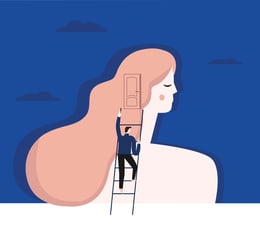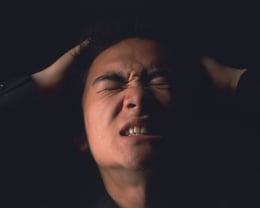
It’s a statistical reality that most people who struggle with addiction also have an underlying mental health condition, such as depression or anxiety. 9.2 millions adults in the US have this situation, called dual diagnosis, according to NAMI - the National Alliance on Mental Health.
If you’re trying to heal from an alcoholism or some other addiction, it’s likely that you’ll be prescribed antidepressants, antianxiety or some other mood disorder medications. But are these medications effective in the long run … and if they don’t work, what does?
To treat addiction and depression long term, medications have a place - and limitations.
Addiction and Depression: When Medications are Appropriate
First, the good news: antianxiety and antidepressant medications can indeed work wonders to stabilize your baseline mental and emotional state.
Often people begin a course of depression or anxiety medication during a personal emergency, when they need immediate relief and stabilization. They’ll visit a psychiatrist and obtain a prescription to help them through the crisis. There’s no shame in needing help to make it through tough times.
Psychotropic medications can build a bridge to mental health and empower you to get through times of difficulty and despair.
However, their long-term effectiveness is questionable.
To understand why, let’s look at the internal mechanisms behind these medications.
How Antidepressants and Antianxiety Medications Work
 You may have heard the term SSRI - Selective Serotonin Reuptake Inhibitors - these are the most popular type of medication to treat depression.
You may have heard the term SSRI - Selective Serotonin Reuptake Inhibitors - these are the most popular type of medication to treat depression.
SSRIs work by upping your level of serotonin, the feel-good neurotransmitter. SSRIs ensure that more serotonin is available in your brain, and as a result, you feel better.
SSRIs are used in the treatment of anxiety as well, but the most popular antianxiety medications are benzodiazepines and beta-blockers. Benzodiazepines are a type of medication known as tranquilizers; familiar names include Valium and Xanax.
They are some of the most commonly prescribed medications in the United States. These classes of medication lessen the physiological manifestations of anxiety, decreasing symptoms such as perspiration, shaking, and a racing pulse.
It’s important to note that while these drugs lessen the physical symptoms of anxiety, they don’t heal it.
When the medication dose wears off, the underlying anxiety is still there.
Medication masks that feeling by giving people an increased sense of well-being.
What Happens When Medications Stop Working?
In the short-term, antidepressants and antianxiety medications can be very helpful.
However, the effects of these drugs change over time. In fact, in many cases they suddenly stop working. The medical term for this phenomenon is tachyphylaxis.
Doctors don’t fully understand why tachyphylaxis occurs, but they do know that it happens all the time.
“Just because you've found a medication that works for you doesn't mean that'll always be the case. Studies show that most patients with depression eventually relapse and become depressed again – even if they're still on the antidepressants that helped them recover in the first place.”
Source: 2015 US News and World Report article Why Your Antidepressants Stopped Working - And What To Do About It
Though doctors don’t know exactly what triggers tachyphylaxis within a particular individual, but one thing is clear …
If you don’t address the underlying emotional issues driving your depression and anxiety, you run the risk of having them come back full-force ... even if you take medication faithfully.
So let’s talk about what fuels depression and anxiety.
The True Nature of Addiction and Depression and Anxiety
 One definition of depression is “anger turned inward.” Perhaps you’ve received the message that it’s not okay to feel or express anger, so you’ve done your best to deny that feeling.
One definition of depression is “anger turned inward.” Perhaps you’ve received the message that it’s not okay to feel or express anger, so you’ve done your best to deny that feeling.
The problem is that denial doesn’t work for long. Stuffing down your emotions doesn’t make them disappear. If anything, it increases their power over you.
When you feel a lot of anger but you lack the emotional space or permission to express it, that anger goes underground. What happens when you divorce yourself from your anger?
Depression is the result.
But did you know that depression and anxiety are connected? If not, here’s how anxiety fits into the picture.
Anxiety arises as part of a refusal to feel our hurt. We want to avoid emotional pain, and that leads to an anxious internal state.
“Now that we're not going to feel our hurt and we're not going to feel our anger, we have our emotions bouncing back-and-forth …. This emotional bouncing up and down is what we call anxiety.”
(See more on Understanding Anger and Addiction.)
In short, when there is a backlog of anger and grief and judgment in your life, you will likely experience mental health symptoms consistent with depression and anxiety.
And for many, self-medication numbs the pain and leads to addiction.
The Limits of Mental Health Medications
Mental health medications have tremendous usefulness, but they also have limits. They can help you to improve and stabilize … up to a point.
When you pass that point, you enter into a harmful dependence. You may begin to double up on doses, taking an unhealthy amount of the medication in an attempt to feel stable. And as time passes, the doses keep increasing.
Simply upping your dosage of depression medication when it stops working isn’t a long-term solution. Real healing takes place when you address the your underlying emotional issues in a gentle, manageable way.
Once you’ve done this vital inner work, you can partner with your doctors and may be able to gradually, safely decrease your dosage of depression and anxiety medications. This does not apply to antipsychotics and other classes of psychotropic medication.
You may even find that your mental health diagnosis shifts once your resentment and sadness are fully felt, seen, and healed.
The Alternative to Addiction and Depression
The alternative to spending a lifetime on medications for depression and anxiety is to address and heal underlying mental and emotional struggles.
We’re certainly not anti-medication. We appreciate the vital role that antidepressants and antianxiety drugs can play in addiction recovery. However, we also recognize that medication can only take a person so far.
We focus on getting to the root cause of people’s depression and anxiety. We don’t settle for medicating away the symptoms; instead, we zero in on the core issues and give people the tools they need to heal from those issues.
Often, these mental health issues diminish in intensity … and sometimes they even disappear altogether.
Learn more:
Free eBook Download:
Healing Underlying Core Issues



